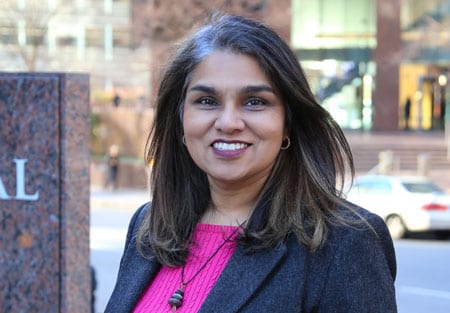 City Light's Uzma Siddiqi believes our destiny is ours to create. As she puts it, “20% is what happens to you and 80% is what you make of it.”
City Light's Uzma Siddiqi believes our destiny is ours to create. As she puts it, “20% is what happens to you and 80% is what you make of it.” Uzma Siddiqi believes our destiny is ours to create. As she puts it, “20% is what happens to you and 80% is what you make of it.” In her 14 years at Seattle City Light as a principal electric power system engineer, she has seized her opportunity to work towards long-term change.
Uzma obtained her bachelor’s and master’s degrees in electrical engineering from North Carolina State University. During her tenure at City Light, she has worked with City Light’s Transmission and Distribution Planning, Engineering Standards, and Customer Service teams before landing in her current position as the principal engineer for Technology Innovation on City Light’s solar resiliency microgrid project.
In this week’s Seattle City (spot)Light, Uzma talks about the benefits of taking a long-term view on major projects.

Technology Innovation Principal Engineer Uzma Siddiqi
“At a municipal utility, you can act in the public good. That works for my values. I’ve been in the private sector before, and I know about the financial constraints of working quarter to quarter,” said Uzma.
“When you’re constantly working toward an immediate bottom line, you don’t always do the things that make the most sense in the long term. At City Light, we tend to think and work in a bigger arc.”
“I do things that (hopefully) make the world a better place for somebody. I don’t need to worry about the minutiae of ‘this quarter, we only made this much money… What are we going to cut next quarter?’ I like that City Light has a longer vision. We are thinking about the public and making sure we do good work on their behalf.”
“Early on, when I started at City Light, I worked on the Sound Transit line. That helps people be mobile and as traffic has gotten worse we have seen the benefit. Providing power to that system in an equitable way was important.”
“The transmission planning work we do makes sure we have power available for our system, and providing reliable power to our customers is crucial. We do our studies and when we see weaknesses we take care of them.”
“Microgrids are another example of looking at the long term. We are working on a resilient solar microgrid community project- basically, a community center that will continue to stay energized, even after a catastrophic event like an earthquake.”
“It’s hard to know what will work in the long run, but you must try. If you don’t play the long game, you will only achieve short gains.”